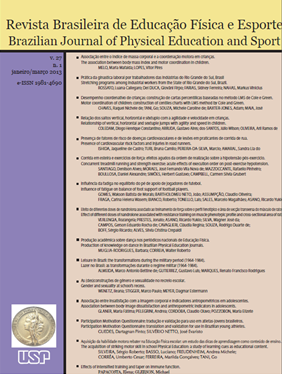Effects of intensified training and taper on immune function
DOI:
https://doi.org/10.1590/S1807-55092013005000001Keywords:
Exercise training, Tapering, Immunity, Leukocytes, Immunoglobulins, AthletesAbstract
Although resting immune function is not very different in athletes compared with non-athletes periods of intensified training (overreaching) in already well trained athletes can result in a depression of immunity in the resting state. Illness-prone athletes appear to have an altered cytokine response to antigen stimulation and exercise. Having low levels of salivary IgA secretion also makes athletes more susceptible to upper respiratory tract infections. Overtraining is associated with recurrent infections and immunodepression is common, but immune functions do not seem to be reliable markers of impending overtraining. There are several possible causes of the diminution of immune function associated with periods of heavy training. One mechanism may simply be the cumulative effects of repeated bouts of intense exercise (with or without tissue damage) with the consequent elevation of stress hormones, particularly glucocorticoids such as cortisol, causing temporary inhibition of TH-1 cytokines with a relative dampening of the cell-mediated response. When exercise is repeated frequently there may not be sufficient time for the immune system to recover fully. Tapering has been described as a gradual reduction in the training load which allows the recovery of physiological capacities that were impaired by previous intensive training and permits further training-induced adaptations to occur accompanied by competition performance enhancements. The majority of the studies that have examined the recovery of immunoendocrine responses during 1-3 week tapers in trained athletes have mainly reported enhanced performance, often accompanied by increased anabolic activity, reduced physiological stress and restoration of mucosal immunity and immune function.Downloads
Download data is not yet available.
Downloads
Published
2013-03-01
Issue
Section
Pedagógica e Comportamental
License
Todo o conteúdo da revista, exceto onde está identificado, está licenciado sob uma Licença Creative Commons (CC-BY)
How to Cite
Papacosta, E., & Gleeson, M. (2013). Effects of intensified training and taper on immune function . Brazilian Journal of Physical Education and Sport, 27(1), 159-176. https://doi.org/10.1590/S1807-55092013005000001


